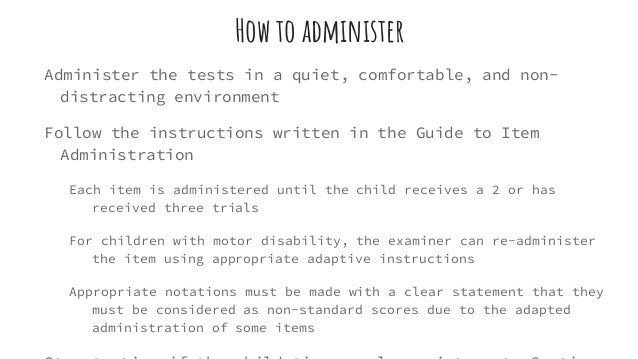ABAS–II is derived from. Five rating forms. That can be used in combination with one another or separately. Each rating form comprises 193 to 241 items and can be completed independently by a respondent in about 20 minutes. The rating scale for the ABAS–II items requires a respondent to. I'm hand-scoring an ABAS-3 (adaptive behavior assessment). The client has significant ID and scored very low on all domains. The corresponding appendix for his age does not list any scaled score less than one, making the minimum sum of scaled scores one could achieve = 10 for overall, 3 for conceptual domain, 2 for social, etc. And this guy hit.

Abas 2 Scoring Manual Guide
The ABAS-3 is now available. Click here to learn more about the ABAS-3 or purchase it. ABAS-2 forms available as stocks last.
A complete assessment of adaptive skills across the life span.
Widely used to evaluate people with intellectual and developmental disabilities, the ABAS-II assesses adaptive behavior in individuals from birth to 89 years of age. This convenient behavior rating scale measures daily living skills--what people actually do, or can do, without the assistance of others. It is particularly useful in evaluating individuals with pervasive developmental disorders, mental retardation, neuropsychological problems, dementias, learning disabilities, biological risk factors, and sensory or physical impairments.
The ABAS-II is compatible with state and federal special education classification systems, it covers the 10 adaptive skills specified in the DSM-IV-TR, and it generates scores that are consistent with the AAIDD definition of intellectual disability.
Multiple Raters, Different Perspectives
The ABAS-II includes five rating forms, each for a specific age range and respondent:
- Parent/Primary Caregiver Form (Ages 0 - 5)
- Parent Form (Ages 5 - 21)
- Teacher/Daycare Provider Form (Ages 2 - 5)
- Teacher Form (Ages 5 - 21)
- Adult Form (Ages 16 - 89)
These forms can be completed by parents, family members, teachers, daycare staff, supervisors, counselors, or others who are familiar with the daily activities of the individual being evaluated. In addition, the Adult Form can function as a self-rating. (If raters have poor reading skills, you may read the items to them.)
Although it's possible to evaluate adaptive skills using only a single rater, you'll get a more complete assessment if you gather ratings from several people. Multiple ratings allow you to see how the individual performs in various settings. Because the ABAS-II requires just 15 to 20 minutes, it's usually easy to obtain ratings from both parents and professionals.
Skills and Domains Consistent With AAIDD and DSM-IV-TR Guidelines
The ABAS-II addresses 10 adaptive skill areas, covering 3 domains:
Conceptual
Communication Skills
Functional Academics
Self-Direction
Social
Social Skills
Leisure Skills
Practical
Self-Care
Home or School Living
Community Use
Work (for adults and working-age youth)
Health and Safety Suramar.
Below are the common errors in SAP transport managementReturn code 4: Imported with warnings Generation of program, colomns or row missing. This blog presents the day to day repeated issues a SAP BASIS consultant would face and its solutions. If you have any more issues and solutions with you to post feel free to discuss with me at sapbasis039@gmail.com. The transport process basically consists of exporting of objects out of the source SAP system and importing them into the target SAP system/s. TMS Stands for Transport Management System The CTS components play an important role in the overall development and customization environment. Transport Management System is one of the key components in SAP system. TMS is used to control new requests, monitor changes like who has implemented the changes, defining and configuring system landscape in SAP environment. TMS consists of 3 different Change and Transport. Transport issues in sap basis.
These domains encompass practical, everyday skills required to function, meet environmental demands, care for oneself, and interact with others effectively and independently. On a 4-point response scale, raters indicate whether, and how frequently, the individual performs each activity.
Scores Provided in Three Useful Formats
The ABAS-II generates norm-referenced scores for the 10 skill areas and 3 broad domains assessed, as specified by AAIDD and DSM-IV-TR guidelines. A total score--the General Adaptive Composite--is also provided. All are presented as standard scores, age-based percentile ranks, and age equivalents. The Manual includes clear guidelines for using ABAS-II scores to plan and monitor interventions.
Norms, based on ratings of more than 3,300 individuals in 31 age groups, are stratified by sex, race/ethnicity, and level of education. In addition to typically developing participants, the standardization sample included 20 clinical groups, representing disorders such as autism, ADHD, and visual impairment.
Scoring Software for Quick Results and Interpretive Guidance
Abas 2 Scoring Manual
While the ABAS-II can be hand scored in just 5 to 10 minutes, computer scoring is even quicker, and it offers several advantages. The ABAS-II Scoring Assistant software provides:
- Conversion of raw scores to standard scores
- Analyses of skill area strengths and composite score discrepancies
- Skill area and composite score profiles
An enhanced version of the program--the Scoring Assistant and Intervention Planner--lets you generate the following:
- A narrative interpretation based on all scores, strengths and needs analysis, composite score discrepancy analysis, and overall summary of adaptive behavior
- A summary comparison of overall intellectual and adaptive functioning if WPPSI-III or WISC-IV Full Scale IQ is entered for ages 2 1/2 to 16
- Item-level interventions for ages 0 to 21
- A Progress Monitoring Report for ages 0 to 21, comparing raw and scaled scores across up to 4 assessments
- A Respondent Report for ages 0 to 21, providing an easy-to-understand description and graph of the individual's adaptive functioning
The ABAS-II Scoring Assistant and Intervention Planner makes it easy to identify appropriate treatment options and monitor progress when you are using the Infant/Preschool and School Forms. Both programs are unlimited use.
The Information You Need for Diagnosis and Treatment Planning
Measuring adaptive skills is important whenever a disability - intellectual or physical - affects daily functioning. Whether you're trying to identify the best learning environment for a child or ensure that an older person can live independently, the ABAS-II provides the information you need to make appropriate clinical decisions and design effective intervention. Its applications are almost endless: a pediatric neurologist might use the ABAS-II to evaluate a child with cerebral palsy; a psychologist might administer it to assess the impact of depression on a client's functioning; and a social worker might use it to guide program planning at an assisted living facility.
Regardless of the setting, the age of the individual, or the nature of his or her limitations, the ABAS-II can help you:
- Assess adaptive skills
- Diagnose and classify disabilities and disorders
- Identify strengths and limitations
- Document and monitor progress over time
- Develop treatment plans and training goals
- Determine eligibility for services and Social Security disability benefits
- Evaluate capability to live independently
Because the ABAS-II conforms to AAIDD, DSM-IV-TR, and IDEA specifications, you can use it with confidence for diagnosis and placement. This versatile test lets you gather information from several respondents in different settings to obtain a complete picture of an individual's functional skills.
Due to the release of the ABAS-3 kits are no longer available.
NB: The Manual and Scoring Assistant covers all ages (from Infants through to Adults).
Online Evaluation System Help
Contact Us
customerservice@wpspublish.com
424.201.8800 or 800.648.8857 (U.S. and Canada only)
Monday through Friday 6 a.m. - 4 p.m. PST
| Q▶▼ | How it Works |
| Q▶▼ | Can I export assessment data? New Feature |
| Q▶▼ | Why can I see FREE products on my WPS Online Evaluation System bookshelf? |
| Q▶▼ | What does the WPS Online Evaluation System (WPS online testing platform) cost compared to conducting assessments with pen and paper? |
| Q▶▼ | What products are available for use on the WPS Online Evaluation System? |
| Q▶▼ | What computer requirements are needed in order to use the WPS Online Evaluation System? |
| Q▶▼ | How do I access the WPS Online Evaluation System? |
| Q▶▼ | Can I purchase online evaluation products directly from the WPS Online Evaluation System? |
| Q▶▼ | How do I activate my licenses? |
| Q▶▼ | I did not receive my activation code or my activation code does not work. What should I do? |
| Q▶▼ | I purchased an online product by mistake. Can I return it? |
| Q▶▼ | Where can I find more information about the WPS Online Evaluation System? |
| Q▶▼ | What is a license? |
| Q▶▼ | Is the WPS Online Evaluation System HIPAA-compliant? |
| Q▶▼ | Can I still purchase pen-and-paper kits and forms? |
| Q▶▼ | Is there a difference between the WPS Online Evaluation System and the online testing platform? |

